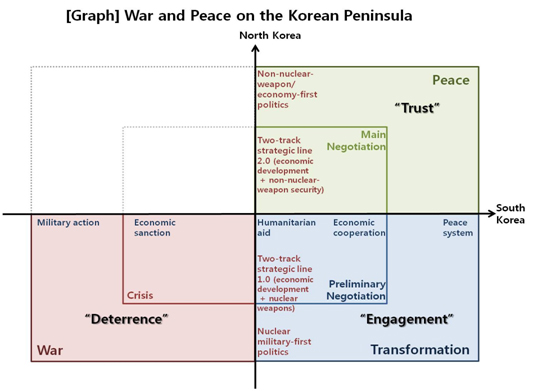![[Executive Summary] Beyond Trustpolitik on the Korean Peninsula](/data/bbs/eng_reports/2014053018241763.jpg)
[Executive Summary] Beyond Trustpolitik on the Korean Peninsula
Others | 2014-05-30
Young-Sun Ha, EAI
2014 EAI Special Report_ Beyond Trustpolitik on the Korean Peninsula
Young-Sun Ha, EAI
Chaesung Chun, EAI; Seoul National University
Dongho Jo, Ewha Womans University
Won Gon Park, Handong Global University
Executive Summary
East Asia Institute (EAI) launched the North Korea Policy research team in order to offer policy ideas that include countermeasures for Pyongyang’s recent strategic line, seeking “simultaneous development of the economy and nuclear weapons capability.” Based on their expertise in security, economics, and international relations, the research team, including EAI chairman Young-Sun Ha, suggests that Seoul should form a complex “deterrence-engagement-trust” strategy to prompt Pyongyang’s evolution from the current self-contradictory strategic line into a new line, line 2.0, toward the path of security without nuclear weapons in tandem with economic development.
Research Question
What measures are required in order to allow inter-Korean relations to evolve from its current vicious cycle of crisis-negotiations-agreement-infringement to irreversible and sustainable peace?
Aim and Purpose
This study suggests a new policy towards Pyongyang that prompts a shift from Deterrence Phase (quadrant III) to Trust Phase (quadrant I) of the graph below, and contributes to the establishment of a peaceful order on the Korean peninsula as well as in East Asia. In order to do so, the research team suggests that South Korea should pursue a complex strategy that simultaneously pursues all measures of deterrence, engagement, and trust-building.

Four Principles
1. [Enhancing Deterrence] Proactively deter and defend against North Korea’s nuclear weapons development and local provocations. South Korea needs to conduct a Korean version of “Deterrence and Defense Posture Review” (DDPR) and secure comprehensive capabilities including Kill-Chain, Korean Air and Missile Defense (KAMD) system, U.S. extended deterrence, and inter-operability of wartime operational control (OPCON), alongside peace system arrangements on the Korean peninsula.
2. [Changing North Korea] Facilitate and promote North Korea’s evolution toward a more reform-oriented, two-track strategic line 2.0 which pursues economic development and security without nuclear weapons. Considering the rigid sanctions of the international non-proliferation regime toward nuclear weapons development, it is unrealistic to simultaneously carry out substantial economic development alongside nuclear weapons development. However, sending the message that the current two-track strategic line is doomed to fail is not conducive in encouraging Pyongyang’s evolution toward strategic line 2.0, as that will only be perceived by the North as a possible path toward regime collapse. Meticulous efforts are needed in order to persuade political elites in Pyongyang to consider an alternative two-track strategic line of seeking security without nuclear weapons and economic development by convincing them of the dilemmas caused by the current two-track strategic line, which is based on exaggerated security threats of hostile U.S. policy toward North Korea. A future vision of a Korean peninsula corroborated by concrete plans including an East Asian peace system is required in this regard.
3. [Promoting International Cooperation] International co-evolutionary efforts initiated by South Korea are essential to support Pyongyang’s evolution. North Korea’s new two-track approach of security without nuclear weapons and economic prosperity should co-evolve with the East Asia Peace and Prosperity Initiative. The current Park Geun-hye administration’s “Northeast Asia Peace and Cooperation Initiative” grounded on functionalism will struggle in East Asia where juvenescent, nationalism-triggered strife is fierce. It may end up only as wishful thinking to expect cooperation in softer and non-military issues to trickle down into security cooperation in East Asia. Furthermore, limiting the scope to Northeast Asia is also marginal. The peace and cooperation initiative should include multi-level, complex networks: harmonious developments of the existing Korea-U.S.-Japan network and the rising Korea-China network in Northeast Asia; as well as collaborative networks with relevant countries and international institutions in East Asia and beyond. Simultaneously, the initiative is required to include not only traditional security and economic issues but also emerging issues of the environment and culture, as well as that of information/knowledge and governance. Under this East Asia Peace and Prosperity Initiative in the long-run, South Korea should help North Korea co-evolve toward a two-track strategic line version 3.0: non-nuclear weapons security and economy-first politics.
4. [Building Trust] Initiate complex trust building processes which includes all phases of deterrence, engagement, and trust. The Park Geun-hye administration’s “Trust-Building Process on the Korean Peninsula” proposes a step-by-step trust-building process to solve the North Korea problem. It addresses Pyongyang’s humanitarian issues first and attempts advanced economic aid/cooperation when North Korea responds to South Korea’s initial efforts. The current status on the peninsula, however, is not placed on quadrant I of main negotiation but is transitioning from quadrant III of crisis to quadrant IV of transformation, to quadrant I of peace. In this regard, a new North Korea policy is not feasible if its measures are confined to specific phases and certain issue areas. Trust-building on the peninsula should pursue a complex manner which encompasses a mitigation of mistrust on quadrant III of crisis; accumulate credit for trust-building on quadrant IV of transformation; and full-fledged trust-building on quadrant I of negotiation. ...(Continued)
This report is the result of the East Asia Institute’s research activity of the Asia Security Initiative Research Center. This report has been translated from the original on February 13, 2012 by Sung Min Yoo and Stephen Ranger.
Center for North Korea Studies
Center for National Security Studies
Others
#38. EAI Internship, What Lies Ahead!
Jiang Chen | 2014-05-30
Others
#37. EAI Internship, What Lies Ahead!
#35. EAI Internship, What Lies Ahead! | 2014-05-30